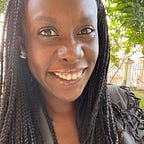She. Elle. Ea.
She.
She rose in the middle of the night, shaken by her father’s panic. “It’s time to go! It’s now.”
Along with her mother and siblings, her family journeyed through the twilight, along paths akin to the underground railroad in structure and spirit. Crossing riverbanks, plains, and forests; seeking freedom from bondage left by colonialism, inept foreign policy, and successive dictatorships. Ramifications that affected her country and others, leaving innocent civilians trapped in a circuitous motion of trauma, despair, and grief.
She doesn’t remember how long the journey took, and how many others there were. She remembers the apprehensive glances between her mother and father; their pleas to her younger brothers, not yet able to control their cries but old enough to know their silence was imperative.
Now in a strange place, with foreign people, and an incomprehensible language. With extended arms, these new individuals embraced her family with hugs, cheers, and warmth.
Absent any sense of time, she has the faintest memory of arriving at an airport, unable to tell you how long it took to reach. A curious structure, one of which she’d never seen, her parents displayed unfamiliar documentation she later learned were passports. The hushed silence that surrounded them shifted, no longer fear of a known enemy but one of a cautionary hope, a yearn for relief, and a prayer their pain would cease.
She arrived hours later, her family intact. Now in a strange place, with foreign people, and an incomprehensible language. With extended arms, these new individuals embraced her family with hugs, cheers, and warmth. Speaking this mysterious language, she now knows they exclaimed customary greetings, and expressed unfettered joy that her family, along with many others, were now in their country. That they were now safe, that they were now free.
She began her primary and secondary education. First placed in classes for foreign language students, eventually excelling with and beyond her native speaking peers. How different her schooling now was, when she could concentrate on matters appropriate for children, and not wonder if another calamitous event would disrupt her life. When she started, she was introduced to her class as a child of refuge, by a teacher who implored the students to be sensitive to matters of which they may not understand and have not experienced. When finished, it was she who addressed her class, recalling their kindness and love, and how thankful she was that her life and journey were shared alongside theirs.
“E pluribus unum,” of many, one. She is one person, but she is many. She is Marie Jana Korbel, later and better known as Madeleine Albright, who twice-fled her home of the former Czechoslovakia, because of Nazi and later Soviet occupation. After settling in the United States, Albright would later be the first woman to serve as U.S. Secretary of State, and eventually be awarded the Presidential Medal of Freedom.
She is Mathangi Arulpragasam, better known as award-winning artist and activist M.I.A, who fled Sri Lanka at nine years old and settled in the United Kingdom. Reconstructing the journey of refugees in her art, M.I.A. dedicated her debut album to refugee children and continues to support organizations in countries affected by war.
She is Rita Ora. She is Gloria Estefan. She is George Soros. She is Alek Wek. She is Albert Einstein. She is the one million refugees resettled in Germany since the refugee crisis that expanded in 2015. She is the teacher, mechanic, fashion designer, and custodial technician that wake every day to live life and not be persecuted. She is the result of humane refugee resettlement policy, whether in the United States, Canada, Kenya, Mexico, Jordan, or Ireland — greeted in English, French, Swahili, Spanish, Arabic or Gaelic.
Recently, the Biden Administration quadrupled the refugee cap of the previous administration, after receiving backlash when indicating they would leave it in place. The previous target of 15,000 was the lowest in the Refugee Resettlement Program’s history. Despite this reversal, the Biden Administration also conceded that the intended target would not be met because of structural inefficiency and the COVID19 pandemic.
The Prime Minister of Hungary, Viktor Orban, vehemently opposes migrants entering Hungary, utilizing any means to stop them at the border. Simultaneously, French police officers are forcibly removing scores of unaccompanied minors in violation of both French and international law. Lastly, the recent Israel-Palestinian war, the continued crisis in Myanmar, as well as the genocide against Muslims in Xinjiang, augment the clarion for humane asylum-seeker and refugee policy.
The perennial outbreaks of violence. The augmentation and support of wealthier nations both directly and indirectly. The inevitable cascade of hostile and protectionist policies which ensue. The result? She cannot leave. She’s not greeted at the airport by well-wishers, as Justin Trudeau greeted Syrian refugees in 2015. She’s not being welcomed into a classroom with curious and unbiased classmates. She may not become a teacher, musician, or Secretary of State. She’s in limbo, experiencing terror, and bereft, like the young girl in Palestine who witnessed her apartment building collapse.
I previously wrote about compassion fatigue, and the oversaturation of information and conflict which leaves people desensitized. It’s easy to turn off, but it’s hard to imagine a world where these extraordinary people cannot thrive, because indifference and disconnect stripped so many of a better life — at home or abroad.
She, whether it be Madeleine Albright or the Dali Lama, needs us to remember that.
